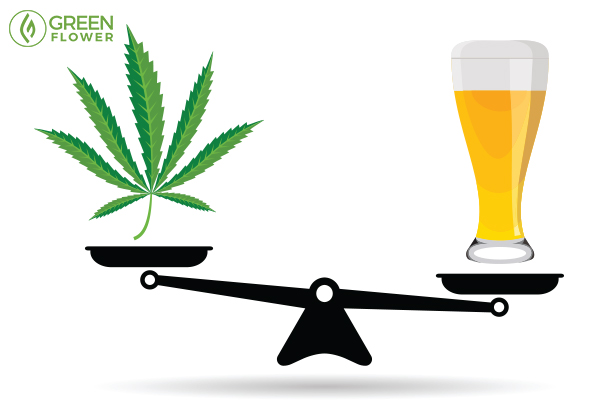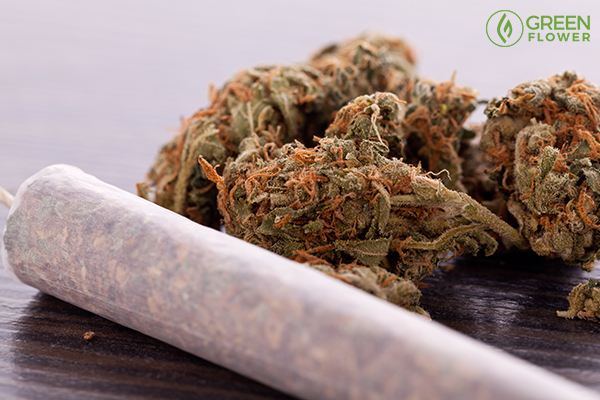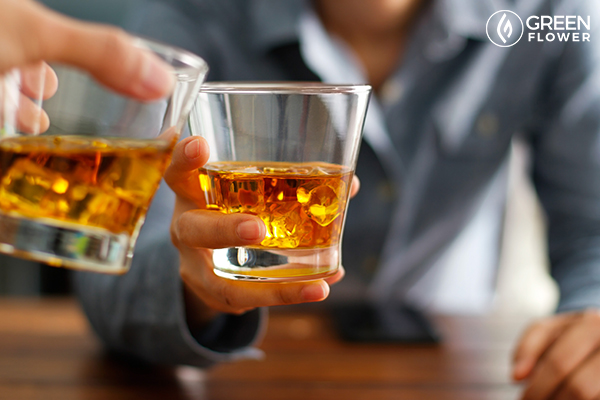
The growing number of cannabis users and newcomers to the cannabis culture often wonder whether cannabis is a healthier substitute for alcohol. People are starting to ask themselves if it’s better to relax after a tough day at work with a drink in hand or a cannabis product.
Studies observing the effects of cannabis versus alcohol have found that there is a good reason to choose cannabis over alcohol.
Cannabis offers fewer health risks and can even lead to distinct health advantages thanks to its medical value.
The Effects of Cannabis VS Alcohol
Both alcohol and cannabis include psychoactive properties that affect brain chemistry to produce altered states of mind.
Biochemical differences in the way these substances work are responsible for the varying benefits and risks that alcohol and cannabis users experience.
Alcohol Pharmacology
When someone drinks an alcoholic beverage, ethanol passes through the stomach into the intestines. It is then absorbed and transported to the liver, where the body starts to metabolize it.
Intoxication occurs when there is too much alcohol for the liver to metabolize, so it’s forced to simply pass the alcohol directly into the bloodstream, where it reaches the brain.
This mechanism is one of the main reasons why alcohol abuse leads to liver disease.
Some studies have associated cardiovascular benefits with drinking small amounts of certain types of alcohol, particularly red wine, but neither the American Heart Association nor the National Heart, Lung, and Blood Institute recommend drinking alcohol to prevent heart disease.
Once in the brain, alcohol depresses a specific neurotransmitter, causing feelings of elation, relaxation, and increased confidence. It also affects fine motor skills and makes rational thinking more difficult. This explains why people tend to agree that drunk driving is dangerous and wrong – yet many do it anyway.
Cannabis Pharmacology

In cannabis, the best-known pharmacologically-active substance is delta-9 Tetrahydrocannabinol (THC). Like ethanol, THC can be metabolized in the liver, but cannabis users don’t have to overload the liver the way alcohol consumers do in order to feel intoxicated.
The amount of THC that enters the bloodstream when eating a cannabis edible, for instance, is about 10-20% of the actual amount ingested.
Inhalation, both of cannabis flower and concentrates, remains the most popular and effective way of using cannabis. This bypasses the liver and delivers THC quickly to the brain through the lungs, where it produces a euphoric, pleasurable feeling while decreasing anxiety and tension when used in moderate doses.
Though higher doses of THC can impair attention, concentration, and short-term memory, cannabis offers long-term benefits associated with its capacity to reduce stress, neutralize mood disorders, and help people with issues like insomnia.
People also use it to treat the side effects of chemotherapy, and new research further indicates it may even play a role in preventing certain types of cancer by targeting cancerous cells and inhibiting tumors.
Cannabis: The Healthier Alternative
Among people aged 15-49, alcohol is the leading health risk factor across the globe. More than 30,000 Americans died of alcohol-induced issues in 2014, whereas zero cannabis users have died from cannabis use alone.
Alcohol abuse has long been associated with violent behavior, liver disease, and increased cancer risk.
Long-term cannabis abuse has only been linked to chronic bronchitis (for constant smokers), temporary cognitive impairment, and certain mental disorders like depression.
Life-threatening complications from regular, moderate cannabis use are unheard of.
Cannabis use is linked to a broad range of preventative health benefits. It has been shown to slow the growth of certain proteins linked to Alzheimer’s disease, reduce anxiety, and lower the risk of diabetes.
All of these facts put cannabis on a clear route to replacing alcohol as the social lubricant of American society in the next decade.
When Will Cannabis Replace Alcohol?

For the time being, a state-by-state analysis of alcohol sales in states according to their various cannabis laws doesn’t offer a clear conclusion.
In some states, medical and recreational cannabis legislation correlate with a significant reduction in alcohol sales.
According to the Distilled Spirits Council, liquor and wine remain mostly unaffected by changes in cannabis law, but beer sales have slumped overall.
It’s likely that this pattern will not change significantly until more states and cities allow social cannabis use laws. In most legal cannabis areas, consumers can only use cannabis in a private setting such as their home.
In order to begin impacting the alcohol industry, legislators have to position cannabis as a viable alternative both in terms of its effects and its delivery – something that you can order at a public venue and easily consume.
RECOMMENDED READ: Why Cannabis is Life-Changing for Liver Disease
Could cannabis help liver disease?
If you needed another reason to switch booze for buds, research shows cannabis could have a profound impact in the treatment of liver disease…
Read: Why Cannabis is Life-Changing for Liver Disease

Author’s Bio:
Tara has been writing cannabis industry-related articles for years. She is the Content Marketing Manager at the California-based company CaliExtractions, a seller of closed-loop extraction systems. With a passion for enlightenment and years of knowledge in the cannabis industry, her articles have stretched from a variety of subjects including the legalization, extraction, and upkeep of cannabis.
Currently, she’s contributing to a variety of blogs in the cannabis industry in hopes to spread valuable information on useful topics for the benefits of the industry.

